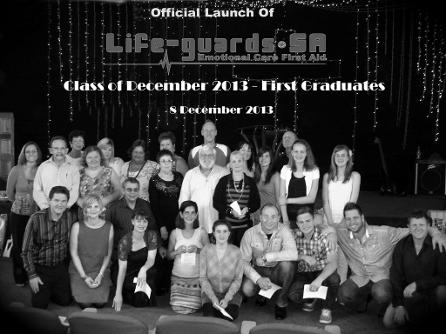ATTENTION! PLEASE NOTE THAT OUR NEW SITE IS LIVE AT WWW.LIFEGUARDSSA.CO.ZA
Life-guards SA saves lives, and homes....

WHY LIFEGUARDS?
Life Guards South Africa was born out of the need for emotional care for people that have gone through a rough time, either terrible trauma like a hijacking, vicious assault, rape or even just “common” disappointments like failing a math test or relationship damage. Most of the time people don’t have anyone to talk to that can offer emotional support.
A life Guard is someone that is trained to respond to and attend to emotional trauma.
A life Guard is trained to bridge the gap between a victim and more professional support i.e. medical service, legal advice, pastoral care, psychological attention etc….
The main goal of the Life Guards South Africa project is to train life guards in as many communities and cities around South Africa.
A. Vision/Mission
Our Vision is to have a Life Guards SA team and call centre in every major city in South Africa by 2030, working hand-in-hand with community leaders, government institutions and political as well as spiritual leaders.
Our Mission
Our Mission is to train life Guards and set up call centers that can effectively offer practical and emotional support to people, to identify their needs and connect them to the proper professional channel, bridging the gap between the victim and the rescuer.
B. Training
Training a life guard takes about 10hrs that includes both theoretical as well as practical training. The minimum age requirement to become a life guard is 18years old.
Children and minors, Victim support, physiological and psychological response to trauma and legal restrictions are just some subjects covered in the Life guards manual…
Life Guards will also be required to research and compile a list of professional services in their own community or town, i.e. police, hospitals, safe havens, psychologists, churches, qualified counselors, drug rehabs etc….
C. Funding
Training fee is R500.00pp
This includes your training package, certification membership fee for the first year.
We also value our sponsors who regularly sponsor anything from business cards and training material to paying our phone bills and traveling, enabling us to continue providing this free service to the community.
D. Professionals
A Life Guard is not trained to provide a professional service, unless he/she is previously qualified. We merely assess a situation and direct people to the correct professional service or authorities.
We therefore partner with professionals, like the police, hospitals, safe havens, psychologists, churches, qualified counselors, drug rehabs etc…. to ensure that people are connected to the appropriate channel, allowing them to regain control of their lives, following a traumatic event or time.
E. Our spectrum of influence
People everywhere suffer from some level of emotional damage and needs emotional or practical support as some time or another.
We have identified 5 areas of influence where we want to train and provide a Life Guard service:
i. Schools
ii. Businesses
iii. Government sector, i.e. hospitals, fire fighters, police service, military etc.
iv. Churches
vi. The biking community.
As a lifeguard, you will be trained to:
- Assist and support a victim after an emotionally traumatic event.
- Assess and connect a victim with the necessary professional help.
- To bring victim in contact with police department, medical assistance, counselors or psychiatrist, rehabilitation programs, victim support, safe houses or specialised trauma counselors. This might require that you make a few phone calls.
- Sometimes all you’ll need to do is to phone a friend or a family member.
- A person going through a traumatic event may experience fear, anxiety, shock, disorientation or sorrow. These are but a few of many emotions that can be experienced. You will be trained to assess and deal with these emotions.
- Accommodate a victim and allow him to express his emotions and gently coach him/her to regain control.

How to become a Life Guard
Contact the office on 081 299 4321 or email us at help@lifeguardssa.co.za to register.
You need to be at least 18 years old and be available to do 10 hours training.
Costs are R500pp and includes training, manual, certificate and membership to the Life guards South Africa community program for one year. An annual membership fee of R300 will ensure that you are updated with the latest training and newsletter. This also ensures that you stay an active life guard in your community.
In each human being has woven into his DNA the desire
to help someone else. Some like helping people, and others like helping animals or the environment.
Some of us have a stronger urge to help than others.
My experience – Burd Cordier
In my life, my folks divorced when I was only 10. They both met someone else and got married again. I had to deal with a step father and mother.
My step mother was deeply troubled and killed her two children and herself when I was 14. A few years later, my father shot and killed himself too.
My troubled childhood almost made a twisted grown-up of me, but through the loving grace of God, I made it through and learned how to deal with my disappointments.
Out of my painful past and traumatic childhood, this need to help others was born. Every time I can help someone, I receive healing for myself...
This drives me to help others...